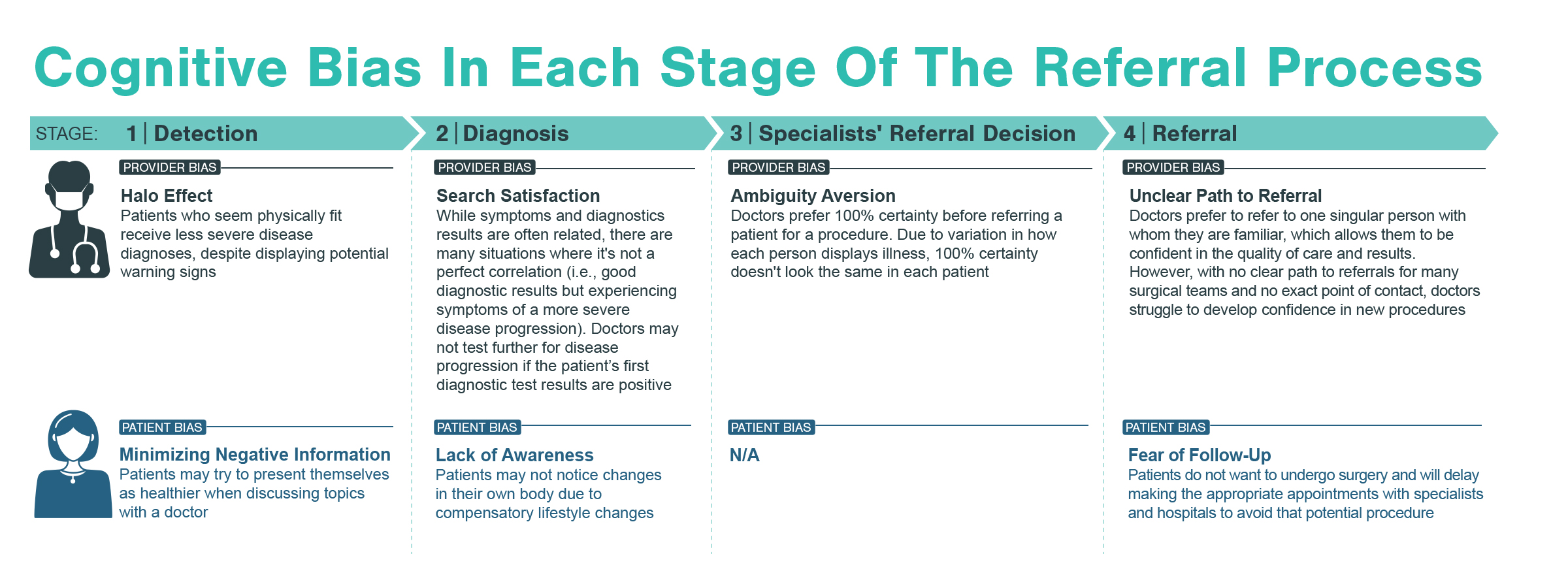How Understanding Cognitive Bias Can Drive Patient Volumes
Understanding Patient and Healthcare Provider Behavior
We all strive to make rational choices. But as humans, we are prone to bias and misjudgment. In the medical field, cognitive biases can have a profound impact on both patients and healthcare providers. Kx frequently conducts studies to uncover cognitive biases in referral pathways, including specialist referrals for more advanced therapies or interventions.
By pinpointing these biases, our team helps specialty drug and medical device clients focus their marketing and education efforts and increase market penetration within their eligible patient population.
Common Dilemmas
Often specialists do not refer patients for treatment quickly enough or at all. These delays in or lack of treatment not only allow the patient’s condition to deteriorate, but also prevent the drug and device companies from fully reaching their addressable patient population. In our recent studies, Kx found that cognitive biases exist at each stage of the referral process.

The Kx Solution
When guiding healthcare organizations by improving their specialist referral pathway, the Kx team runs an in-depth qualitative analysis speaking with specialists to understand critical attitudes, behaviors, and beliefs across the population of relevant doctors. Key differences within demographic segments (e.g., age, specialty, practice type) and behavioral segments (e.g., willingness to refer, referral choice) help identify drivers of attitudes and potential solutions for changing these behaviors.
Uncovering Cognitive Bias to Reach the Addressable Patient Population
Kx developed the following key findings to drive the patients through the specialist referral pathway:
- Awareness that symptom recognition is often the most significant barrier in the referral process and education to combat the issue. Early in the referral process, during the diagnosis phase, cognitive biases result in the specialist not probing consistently, missing symptoms by not asking the right questions, or simply not asking enough clarifying questions. Incorrectly identifying patients’ health status based on outward appearance or insufficiently probing symptoms can result in critical underdiagnoses or undertreatment.
- A clear path to referral, particularly one with a singular point of contact, can help referring physicians feel more at ease. Successful drug and device companies reduce friction in referral pathways by helping referring physicians establish clear points of contact across hospitals, specialists, and surgical teams. Elucidating a single point of contact cuts down on ambiguity and removes an obstacle for referring providers.
- Direct relationships between the referring specialists and the treatment teams (surgery team) build comfort and encourage referrals.
- When creating tools for doctors, simplicity and ease of use are key factors. Biases exist among doctors to simplify complex thought processes. Though tools, like decision guides for complex cases, can be extremely beneficial, they must be simple and easy to understand and use to overcome biases and help physicians better identify which patients need further treatment.
How Kx Can Help
Our healthcare experts can guide you by adjusting various aspects of our corporate strategy, including your referral pathway, with insights from market research. Cognitive bias is built into our research methodology, enabling your team to overcome any we find and fulfill more referrals. As data-driven decision-makers, we design research using both traditional factors and behavioral science to pinpoint process improvement and qualitative analysis opportunities.

